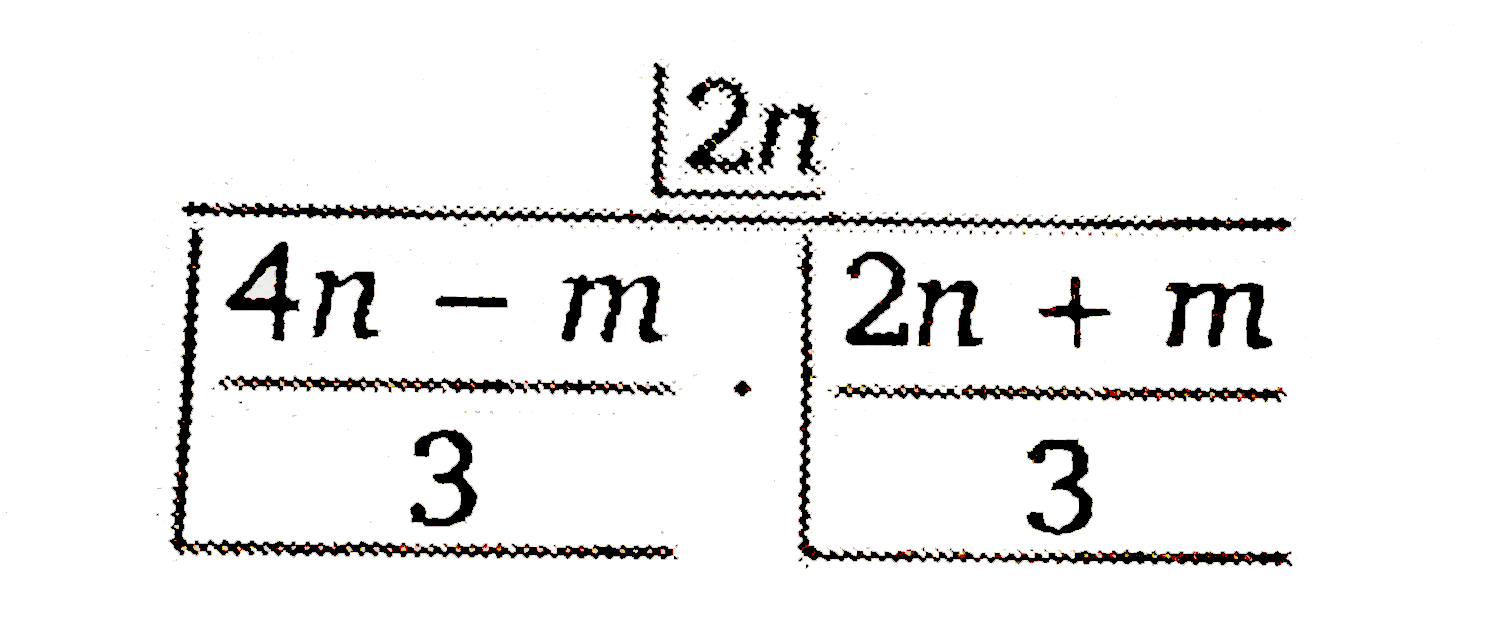For a positive integer n if the mean of the
binomial coefficients in the expansion of (a+b)2n−3 is 16 Then n is equal to
4
5
7
9
The correct Answer is:b
To solve the problem, we need to find the value of n given that the mean of the binomial coefficients in the expansion of (a+b)2n−3 is 16.
1. Understanding the Binomial Coefficients:
The binomial coefficients in the expansion of (a+b)2n−3 are given by:
(2n−30),(2n−31),…,(2n−32n−3)
There are 2n−3+1=2n−2 coefficients in total.
2. Calculating the Mean:
The mean of these coefficients can be calculated as:
Mean=∑2n−3k=0(2n−3k)2n−2
From the Binomial Theorem, we know that:
m∑k=0(mk)=2m
Therefore, for m=2n−3:
2n−3∑k=0(2n−3k)=22n−3
Thus, the mean becomes:
Mean=22n−32n−2
3. Setting Up the Equation:
We know from the problem that this mean is equal to 16:
22n−32n−2=16
4. Cross-Multiplying:
Cross-multiplying gives:
22n−3=16(2n−2)
5. Substituting 16:
Since 16=24, we can rewrite the equation:
22n−3=24(2n−2)
This simplifies to:
22n−3=24⋅(2n−2)
6. Equating the Powers of 2:
We can express 22n−3 as:
22n−3=24+1⋅(2n−2)⟹2n−2=22n−7
7. Rearranging:
Rearranging gives:
2n−2=22n−7
8. Finding n:
We can solve for n by substituting values. Testing n=5:
2(5)−2=10−2=8
And checking:
22(5)−7=210−7=23=8
This holds true.
Thus, the value of n is:
5
The binomial coefficients in the expansion of (a+b)2n−3 are given by:
(2n−30),(2n−31),…,(2n−32n−3)
There are 2n−3+1=2n−2 coefficients in total.
The mean of these coefficients can be calculated as:
Mean=∑2n−3k=0(2n−3k)2n−2
From the Binomial Theorem, we know that:
m∑k=0(mk)=2m
Therefore, for m=2n−3:
2n−3∑k=0(2n−3k)=22n−3
Thus, the mean becomes:
Mean=22n−32n−2
We know from the problem that this mean is equal to 16:
22n−32n−2=16
Cross-multiplying gives:
22n−3=16(2n−2)
Since 16=24, we can rewrite the equation:
22n−3=24(2n−2)
This simplifies to:
22n−3=24⋅(2n−2)
We can express 22n−3 as:
22n−3=24+1⋅(2n−2)⟹2n−2=22n−7
Rearranging gives:
2n−2=22n−7
We can solve for n by substituting values. Testing n=5:
2(5)−2=10−2=8
And checking:
22(5)−7=210−7=23=8
This holds true.
5
Topper's Solved these Questions
- BINOMIAL THEOREM AND ITS APPLCIATIONS BOOK - OBJECTIVE RD SHARMA ENGLISHCHAPTER - BINOMIAL THEOREM AND ITS APPLCIATIONS EXERCISE - Section I - Solved Mcqs
100 Videos
- BINOMIAL THEOREM AND ITS APPLCIATIONS BOOK - OBJECTIVE RD SHARMA ENGLISHCHAPTER - BINOMIAL THEOREM AND ITS APPLCIATIONS EXERCISE - Section I - Assertion Reason Type
13 Videos
- CARTESIAN CO-ORDINATE SYSTEM BOOK - OBJECTIVE RD SHARMA ENGLISHCHAPTER - CARTESIAN CO-ORDINATE SYSTEM EXERCISE - Exercise
27 Videos
Similar Questions
If the coefficient of 4th term in the expansion of (a+b)n is 56, then n is
View SolutionIf the coefficient of 4th term in the expansion of (a+b)n is 56, then n is
View SolutionThe sum of the binomial coefficients in the expansion of (2x3+32x2)n is 64 then the term independent of x is
View SolutionIf n be a positive integer and Pn denotes the product of the binomial coefficients in the expansion of (1+x)n, prove that Pn+1Pn=(n+1)nn!.
View SolutionIf n is a positive integer then find the number of terms in the expansion of (x+y−2z)n
View SolutionIf n is a positive integer then find the number of terms in the expansion of (x+y−2z)n
View SolutionIf n is a positive integer, then the number of terms in the expansion of (x+a)n is
View SolutionIf 36, 84, 126 are three successive binomial coefficients in the expansion of (1+x)n, find n.
View SolutionIf the sum of the binomial coefficients in the expansion of (x+1x)n is 64, then the term independent of x is equal to (A) 10 (B) 20 (C) 30 (D) 40
View SolutionIf 'n' is a positive integer then prove that the coefficient foxm in the expansion of (x2+1x)2n is :

View Solution
